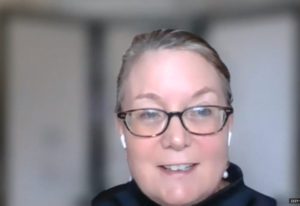

Margaret Hurley, Chief of the Municipal Law Unit in the Massachusetts Attorney General’s Office, discussed the behind-the-scenes role the unit plays in reviewing home rule petitions.
The Massachusetts Municipal Management Association’s monthly meeting on Sept. 17 explored the origins of home rule in Massachusetts and the ways it is being used today.
The webinar speakers were MMA Executive Director Geoff Beckwith, Arlington Town Counsel Doug Heim, and Margaret Hurley, chief of the Municipal Law Unit in the Massachusetts Attorney General’s Office.
Ratified in 1966, the Home Rule Amendment to the Massachusetts Constitution (Article 89) explicitly provides that every city or town in the Commonwealth is entitled to a charter and outlines the process for the adoption, revision and amendment of a charter. The Home Rule Act (Chapter 43B) further defines the powers of cities and towns to enact their own legislation on many subjects (so long as they do not conflict with federal or state law) without the need to wait for advance approval from the Legislature.
Nationwide, the concept of home rule grew slowly through the development of state case law, U.S. Supreme Court rulings and laws enacted by states, said Beckwith, who provided a historical overview. The U.S. Constitution doesn’t mention municipal governments, and the 10th Amendment grants powers not held by the federal government to states alone, he said.
Beckwith said Massachusetts is “better positioned than so many other states in terms of having a framework that provides guidance for home rule authority,” but cities and towns in reality have limited home rule powers.
In Massachusetts, a municipality can file a home rule petition for special legislation affecting its community alone. According to Beckwith, home rule petitions can become enmeshed in controversial debates, and home rule petitions can receive pushback from those who view the process as an impediment to widespread progressive change. He praised local officials’ strategic thinking and diplomacy, and said they have a role to play in emphasizing home rule’s benefits.
“Talking about hometown democracy, grassroots governance, your own local decision making closer to the people is really a better way to frame the whole local control debate that we have,” Beckwith said.
In recent years, Heim said, the town of Arlington has been considering how it might address a range of complex issues, such as whether the town should legally recognize domestic partnerships of three or more people, ban the use of rodenticides, or implement ranked-choice voting. Sometimes these types of discussions become home rule petitions sent to Beacon Hill.
“Arlington has been filing more and more home rule petitions, it seems, every year, and they’re about bigger and bigger subjects,” Heim said.
Heim suggested, however, that home rule petitions shouldn’t be the default option. When a petition is proposed, he said, it’s worth undertaking a deep analysis of the issue that includes, but is not limited to, reviewing the provisions of Article 89 and the town’s existing bylaws; considering past decisions by the Municipal Law Unit and the likelihood of the effort’s success; examining the motivations for the petition, the long-term effects on the community, and the impacts on staffing and resources; and discerning whether different legal mechanisms would address the issue more effectively.
The home rule process can be complicated, he said, lacking the clarity and transparency that people crave at the local level.
“Oftentimes, a home rule petition will be oriented toward empowering a municipality to pursue something that will end up in a local ordinance or bylaw, but that’s not always the case,” Heim said. “And there are some ways in which it adds layers to the government that are not always easily discerned by the general public, or even some public officials.”
The Municipal Law Unit cannot provide legal advice to communities regarding home rule petitions, but it can provide helpful information for communities that are considering proposed laws. (The Municipal Law Unit is responsible for reviewing charter amendments and the legality of general or zoning bylaws and amendments adopted by towns.) Hurley acknowledged her unit’s behind-the-scenes role in the process as well as its commitment to policy neutrality.
When reviewing bylaws, she said, “we see our role as — we must approve the bylaw unless there is a clear conflict with state law.” For example, in a lengthy decision a few years ago, the unit approved a Concord bylaw banning the sale of plastic water bottles — a first for Massachusetts — and then numerous other communities followed suit.
“That’s an example, I think, of where a local groundswell of support can enact more regional change, and we’re seeing that more and more, especially in the topic of environmental issues,” Hurley said.
Several communities are now seeking to restrict fossil-fuel connections in new buildings or major renovation projects. Last year, the Municipal Law Unit did not approve a Brookline bylaw that would have banned such fossil-fuel hookups, on the grounds that it conflicted with state law. Following that decision, and after further review, Brookline has since filed a home rule petition to allow for the fossil-fuel restrictions. Brookline’s home rule petition, along with similar ones filed by Acton, Arlington, Concord and Lexington, now await legislative action.
Written by Jennifer Kavanaugh, MMA Associate Editor